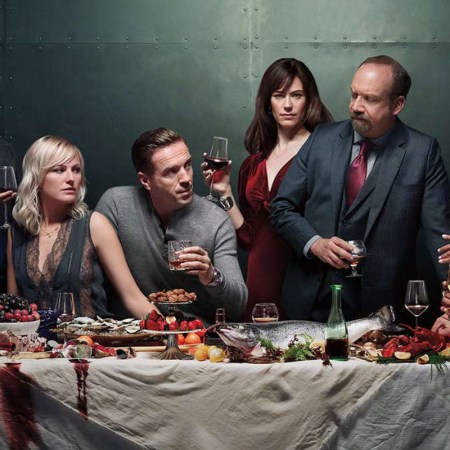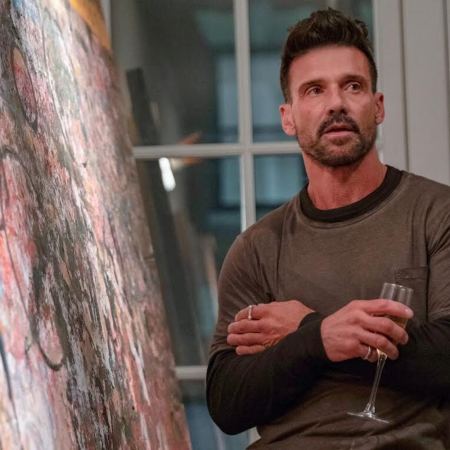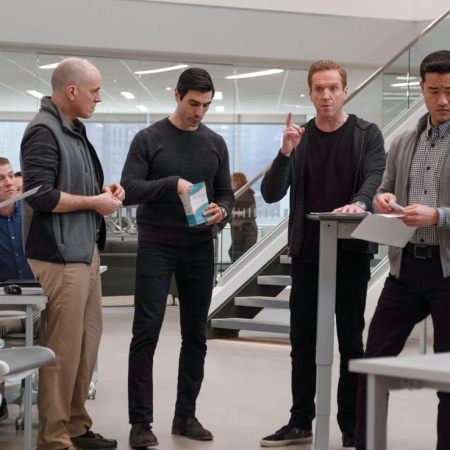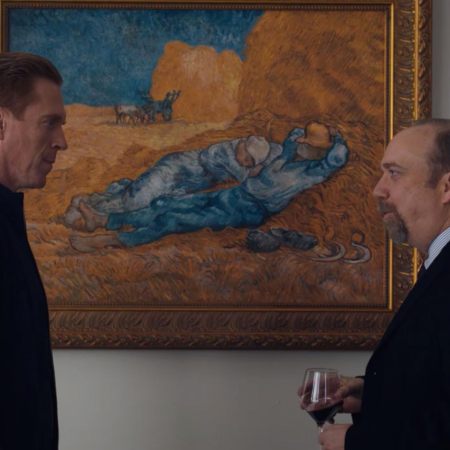Every Sunday night, we’ll be diving into the latest episode of Billions — the best finance-driven dramedy on premium cable — with a technical assist from Elliot Grossman, a veteran of the financial services industry. Since Billions is loosely based on real characters, we’ll be homing in on how the show tracks with the real world events and situations that inspire it. But of course, we’ll also be celebrating its wild excesses, shoddy ethics, endless cringes and highly questionable dancing.
Last week, we tackled Season 5’s second episode, “The Chris Rock Test.” This week, we’re trying to keep up with “Beg, Bully, Bribe.”
Take That to the Bank
Last we left off, Axe was continuing to suffer infuriating losses at the hands of his very punchable rival Mike Prince. First, Prince steals the Vanity Fair cover, then he steals Axe’s shaman Bram Longriver. In “Beg Bully Bribe,” he steals Nico Tanner and his Implosion Series paintings not because he is a fan of destruction-themed abstract art, but simply because he knows Axe is a fan.
The genius of Tanner’s work (according to Axe) is that it depicts “humility in the face of inevitable decay.” Of course, this insight when uttered in front of Prince in the opening minutes of the episode rings like either a threat or an omen. So how will Axe mete out his revenge? I’m not one for wild speculation, so instead, let’s talk about Axe’s seemingly insane plan to establish a bank, which appears to be shaping up to be a major plotline for the season.
While there may be some aspects of the show that border on parody (or full-on inhabit them to perfection), part of what I love about Billions is that it also seems to pride itself on intricate yet somehow plausible financial schemes. I quickly wondered if Axe forming a bank passes the smell test. According to our guru Elliot, the Axe’s gambit is “accurate, albeit melodramatic.” Through the reemergence of Hard Bob (the always incredible Chelcie Ross), who brings his magical hybrid of Connie Hilton meets “Up your butt, Jobu” energy to Billions, we are made to understand just how difficult this feat will be.
“New national banking charters, which the FDIC regulates, are very rarely conferred,” Elliot explains. “There have maybe been a handful in the last 10 years and I am sure they required years of work to be granted.” Buying a bank is no picnic either. “Acquiring an FDIC member bank is equally difficult,” he adds. “The rule of thumb is that you need to be an FDIC member already to purchase another FDIC member. New entrants are rare. I believe this was already the case prior to 2008, but even more so after. State chartered banks are likely to be a similar, but maybe not as rare, occurrence.”
Sell Your Soul
From the fable of bluesman Robert Johnson to The Twilight Zone to Homer Simpson (whose eternal weakness was the donut), the selling of one’s soul has always been a trope in our highest forms of culture. And Billions is certainly no exception.
This episode has a lot, literally and figuratively, about selling your soul. Is the burden of artistic integrity enough to keep Nico Tanner from allowing himself to be a modern-day Medici-funded Michaelango? Apparently not.
And then there is the poor headmaster of Gordie Axelrod’s prep school, who places Axe in a true bind by declaring, “No matter how hard you try I will not allow you to put a price on Gordie’s soul” after a crypto-mining mishap. Will Axe let his son Gordie twist and let the dean of Skinner Prep get away with calling Axe a modern-day robber baron? We learn that if the long-term effects of expulsion for Gordie were positive, Axe would have let the hammer drop on his own son. But they weren’t, and so Axe instead gets to humiliate the headmaster, strike a blow for capitalism and turn Gordie into a prep-school legend. For Axe, it’s an absolutist model.
For others, it’s more complicated. Prior to this week, Wendy and Taylor were, respectively, trying to navigate the thorny personal and ethical boundaries of their worlds. These two threads converge nicely this week in an excellent scene where Taylor (very unexpectedly) solicits advice from Wendy about how to convince the dean of Lawrenceburg University to divest from fossil fuels, even if that grants his sanctimonious students a victory in the process. (Between Gordie, Taylor and Chuck’s adventures, how many morally compromised academies can we get in one sitting?!)
Everything you need to know about people, Wendy explains, revolves around “convictions running headlong into layers of psychological baggage.” This perspective, which encompasses both those tricky forces of “evolution and social convention,” seem especially poignant coming from Wendy, who is working to extricate herself from Chuck and yet finds herself more entrenched again by the end of the episode. Everyone in the room is battling a delusion. “You don’t believe in the religious concept of a soul,” Wendy tells Taylor after offering to buy their soul for $10, “yet you still hesitated in selling yours.”
For Taylor, moral hesitation has consequences. Last week, Chuck warned Taylor that the lack of a monstrous killer instinct — what Axe explains to a bunch of prep-school kids as a self-selecting “harnessing of that nature” — will harm them in business. This week, Taylor loses Mason Cap COO Sara Hammon after failing to make a backend profit on Lawrenceburg University’s fossil fuels divestment coup. “We’re at work, not a fucking climate rally,” Hammon snipes on her way out.
Naturally, this gets me wondering about how morality plays out in the finance industry. Is there a hippocratic oath emerging for investors? “I think what investors are seeing vis-a-vis morality and investing is that the two are not diametrically opposed,” Elliot explains. “Morality often espouses a ‘long-term value’ or enduring philosophy. A lot of ‘immoral” investments (e.g., tobacco companies) are losing because they don’t endure. Tobacco’s customers get sick and die.”
“On the same note,” he adds, “some companies, particularly in the food industries, are succeeding by espousing their health benefits and benefits to humanity, e.g., Annie’s Homegrown, Beyond Meat…”
That’s definitely more food for thought as the intensity of Season 5 ratchets the hell up.
Odds and Ends
- What was the meaning of last week’s episode title, “Chris Rock Test”? I’m embarrassed to say, I missed it, so thanks to Jack Greenman who wrote in to explain that, “Rock did a skit about why he works so hard and what it’s like raising daughters. He says every father’s goal is ‘to keep your daughter off the pole.’” And there you have it.
- A small moment of silence for Mark Blum, who played the role of Chuck Rhoades’s therapist in last week’s episode. He died of coronavirus complications in March.
- For those interested in selling their souls, eBay, which has repeatedly run into this problem over the years, has a pretty theologically introspective guide to why they won’t let people put their souls up for auction. It goes: eBay does not allow the auctioning of human souls for the following reasons: If the soul does not exist, eBay could not allow the auctioning of the soul because there would be nothing to sell. However, if the soul does exist then, in accordance with eBay’s policy on human parts and remains, we would not allow the auctioning of human souls.
Until then, you have our permission to speak freely.
This article was featured in the InsideHook newsletter. Sign up now.
























